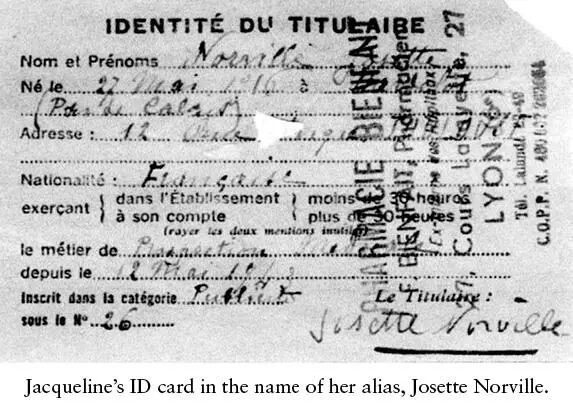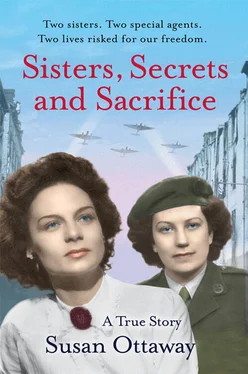Then, in mid-April, Amédée Maingard ( Samuel ) parachuted from an RAF Halifax on to a dropping zone 6 kilometres from Tarbes. Southgate met him and the two men made their way to Châteauroux, where Maingard, a Mauritian, made his base at a safe house organized for him by Jacqueline. He and Jacqueline began to meet regularly, usually at least three times a week, and his arrival made a huge difference to the efficiency of the circuit and lessened the security risk to Jacqueline, as she now only had to pass messages to one person. She always carried the messages by hand and was prepared to either destroy them or swallow them if there was any danger of her being caught. She sometimes had to carry what she referred to as ‘compromising objects’ in her bag:
If I feared an inspection at a station exit I would call a porter and get him to take my bags to the left luggage where I would collect them later. If my cases had been opened I always had enough time to disappear.
Sometimes the Germans helped me as I got off a train and gallantly carried my luggage. That helped me get through the checks without any problems. 2
Southgate’s cover story for his role in the circuit was that he was an inspector and engineer for a company manufacturing gasogene, 3 the gas substitute used for powering cars in France during the war. This gave him a good reason for all the travelling he undertook and sometimes gained him access to factories, which allowed him to assess the practicalities of sabotage. As a security precaution he always carried literature about his supposed employer and could speak with some authority about gasogene. Jacqueline’s cover as a saleswoman for a pharmaceutical company 4 also gave her a very plausible reason for being on the move and, since the story was so close to her actual employment before leaving France to come to England, she too had few problems in maintaining the deception. But despite this the work was very dangerous.
Because of the distances she travelled, Jacqueline sometimes had to stay in hotels. This was not as easy as she had imagined. Not only did she have to avoid German soldiers without overtly appearing to do so; she also had to be on the lookout for those in plain clothes and for checks carried out by the Milice, the Vichy French volunteer paramilitary organization whose members subscribed to the abhorrent Nazi ethos. Although in her previous career she had been used to staying in hotels, she had done so as a legitimate sales representative, with genuine papers. Those she had carried when she first arrived, although excellent, were fake and one of her first tasks had been to obtain French-made documents. The day after she received her new cards she had to use them when the hotel in which she was staying in Châteauroux was subjected to a police raid.

She was washing her underwear in the basin in her room when there was a knock at the door. Believing it to be an expected visit from a member of the Resistance, Jacqueline hurriedly opened the door to be confronted by a plain-clothes policeman. Genuinely dismayed about being caught with her wet undergarments still in her hand, she began to blush and stammer her apologies for coming to the door in such a state. The young policeman was also flustered, and their mutual confusion diffused the situation. He asked for her papers, she produced them, and he gave them a cursory look before handing them back and fleeing in embarrassment.
Later that evening there was another raid and this time Jacqueline was prepared. When the knock on her door came she opened the door but pretended to have been asleep and, rubbing her eyes and yawning, asked what the policeman wanted. He mentioned Southgate, using the name under which he was known in the area – M. Philippe. Jacqueline yawned some more, and tried to look drowsy and confused. Her acting fooled him and, seeing that he would get no sensible answers from her in that state, he apologized for disturbing her and went away. She didn’t get much sleep that night. The police knew Southgate’s alias and that he was somehow linked to her. She couldn’t understand who could have told them and knew that she had to get away as quickly as possible. Not wanting to attract attention in the hotel by leaving in the middle of the night, and afraid that, if she did take that chance, the police might be keeping a watch outside, she decided to stay until the morning. As soon as it was light she took her small bag and checked out of the hotel. Later she learnt from a member of the Resistance group in the area that the police had returned just after she left, no doubt hoping to question her again when she was wide awake.
The incident proved to Jacqueline that it was not safe to stay in hotels too often and thereafter she tried to avoid them as much as possible, preferring tried and tested safe houses. But sometimes there was no other choice. On another occasion she was again disturbed twice, by two different police officers knocking at her door. She did not panic; she just showed her papers and answered their questions, and later she discovered that they hadn’t been interested in her at all. There had been a robbery in the area and every hotel room was being checked in the hope of finding the thieves.
When not taking a chance by staying in a hotel Jacqueline frequently slept during her long train journeys. More often she could only cat nap, and spent much of her time knitting socks for herself and her colleagues. On the rare occasions when she had to stay in Paris, she used her own family home there. The apartment that had belonged to her grandparents and in which the Nearne family had lived when they first came to France was empty, so Jacqueline made it available as a safe house for Southgate and other agents, although, ever cautious, she stipulated that it was not to be used very frequently. An empty apartment that had different people coming and going regularly was bound to arouse suspicion, and she wanted to avoid the possibility of it being the target of a raid.
Jacqueline’s frequent trips away from her base in Clermont-Ferrand gave her an opportunity to contact her brother Francis. He had remained in the Grenoble area, living with his wife, Thérèse, and son, Jack, at the Villa Picard in Saint Egrève, a few kilometres from the city. When, in May 1943, he heard from Jacqueline that she was back in France and would like to meet up with him, he jumped at the chance. Francis knew only that both his sisters had gone to England to look for a way to help the Allies, but when he and Jacqueline met she swore him to secrecy and told him something of what her work in France entailed. She described how difficult it was for her entire group because of the vastness of the area they covered and asked him if he would be willing to undertake ad hoc courier missions for the circuit.
Francis was still a rather nervous young man. He believed that the difficulties he had faced after arriving in France as a child, and the fact that the education he had received had been rather poor, had resulted in him being unable to secure a good job that would allow him to look after his wife and child properly. Because of his nervous disposition he had been unable to hold down any job for very long but had been getting along quite well in his last position as a salesman for a stationery company, Maison Marassi, until it had closed soon after the start of the war because the manager was Jewish. Francis, like the rest of his family, had remained British and, as a foreigner, had also been made to live in a residence forcée , but he had been allowed to go into Grenoble every day, where the company for which he had worked was located. The closure of the business had created problems for him, as he had barely been able to support himself and his family on the meagre wages he had received, even with the help of 2,600 francs that he received from the Swiss consulate in Lyons, 5 and without the wages, his life and the lives of his wife and child had had to change drastically. He was also acutely aware that he was the only one of the four siblings not to be doing anything for the war effort. He decided that the time had come for him to join the fight against the Nazis and agreed to Jacqueline’s proposal. She reassured him that if he did become a courier he would be looked after and that she would be the one to allocate the work he undertook. She would be his contact in the circuit and would arrange all the meetings that he had with members of the group so that no one would have to know his true identity, nor he theirs, and the safety of his family would not be compromised.
Читать дальше













